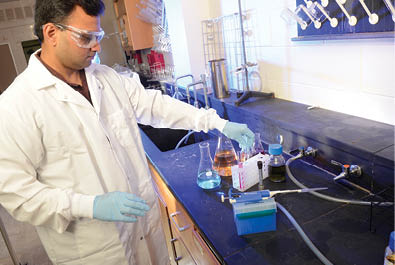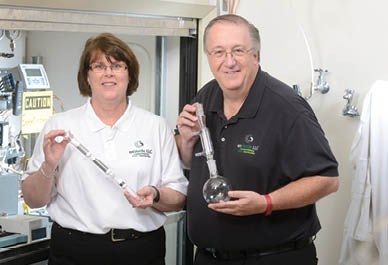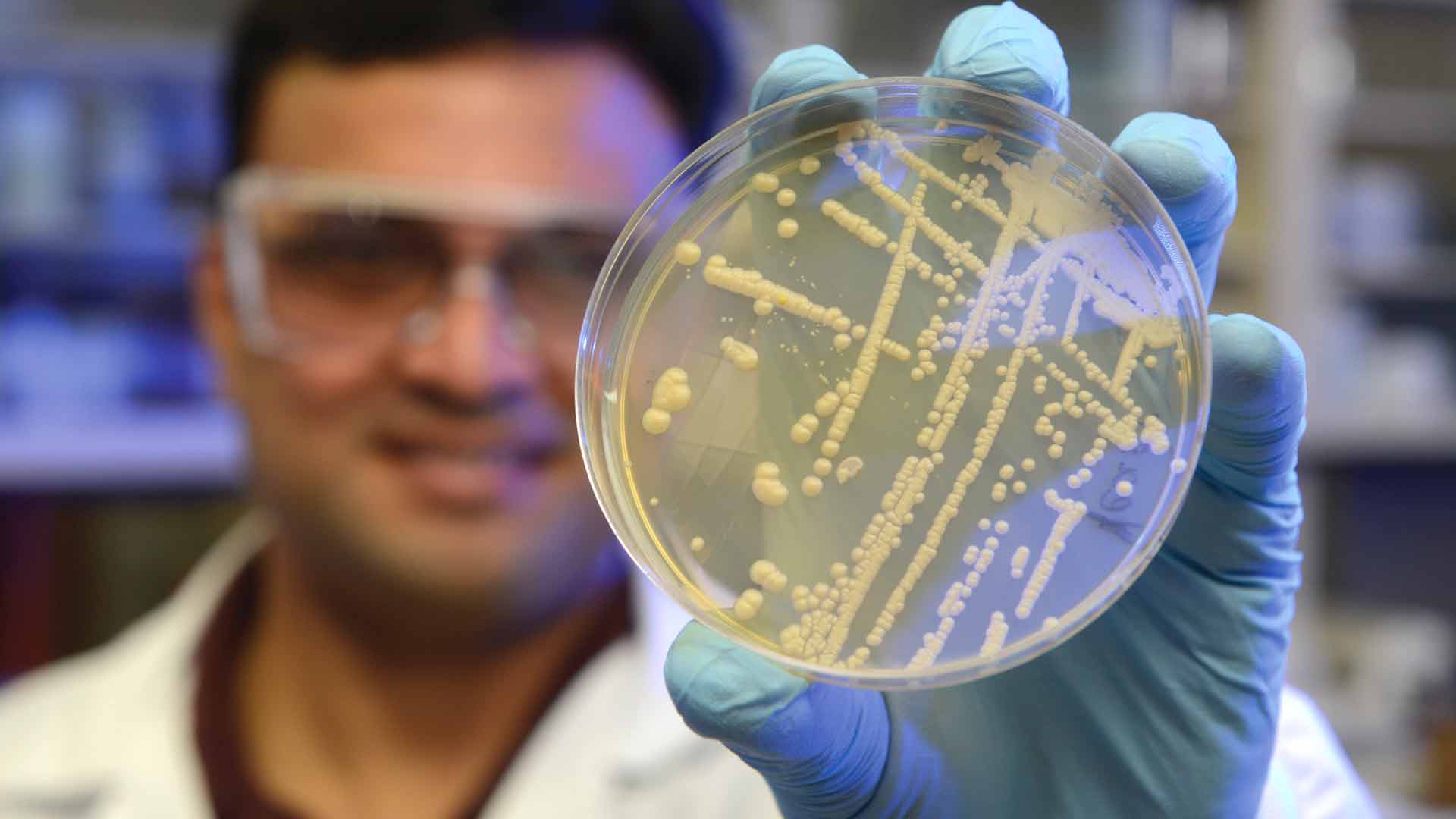AURI’s Entrepreneur in Residence Program Provides Vital Resources for Innovators
It’s not easy being on the cutting edge. Entrepreneurs and startup business face numerous hurdles on their path to success, but generating an innovative idea worth investigating isn’t usually one of those roadblocks. The challenge comes in having the right resources to take the concept to commercialization.
Having worked with innovative businesses for more than 25 years, AURI leadership recognized that Minnesota faced a void that was limiting the development opportunities for some businesses.
“We looked at the challenges facing entrepreneurs and most of them weren’t about having good ideas with merit,” says Rod Larkins, AURI senior director of science technology, “they had to do with facilities and expertise.”
Larkins says that for entrepreneurs, especially those whose products or processes are heavily science-based, affordable resources to help further develop their product or process are often lacking or nonexistent. Because AURI already provides scientific and technical assistance to innovative companies, Larkins had an “a-ha” moment.
“The more I looked, the more I saw the opportunity to make AURI lab space available to these scientists,” Larkins says.
An Innovative Approach
AURI responded by creating the Entrepreneur in Residence program. Approved clients whose projects are vetted and are seen as providing a benefit to Minnesota agriculture from AURI involvement can gain access to AURI’s facilities and the accompanying expertise available at laboratories in Marshall, Waseca and Crookston under this program. Potential projects can fall under any of AURI’s four focus areas including biobased products, food, renewable energy or coproduct utilization.
“It’s a perfect fit for AURI’s mission because our job is to help make entrepreneurs successful,” Larkins says. “We’re here to work on increasing the volume and value of commodity utilization—the Entrepreneur in Residence program helps us fill that role in
a unique way.”
Scientific laboratory facilities can be very expensive to build and few opportunities exist for Minnesota start-up companies to access standing facilities or supporting expertise needed to help develop their products or process.
“Laboratory space and equipment can be major barriers to moving technical innovations forward due to the high cost of rent and equipment,” says AURI Executive Director Shannon Schlecht. “There are a limited number of wet laboratory spaces available in Minnesota for new businesses to utilize in their early stages. AURI is fortunate to have those resources. The idea is to provide space to conduct the initial bench scale experiments to show proof of concept and then have a company graduate to their own facility if the first stage is successful.”
Approved companies are trained on safety procedures and equipment operation as part of their Entrepreneur in Residence agreement. In addition to the tools and equipment, entrepreneurs gain access to the technical expertise of AURI staff who work in the laboratories.
“The entire organization has embraced it,” Larkins says. “They see the value. It is a work in progress, but we’ve seen success from it already and we hope to grow the program.”
Goutham Vemuri knows the challenges technology-based innovators face. Vemuri is founder and chief technologist for Sasya, a Minnesota-based startup company that focuses on producing chemicals and nutraceuticals. Vemuri says those products are typically produced from petroleum, which make them susceptible to oil price volatility and socio-political fluctuations.
“We are developing sustainable technology to produce chemically and structurally identical counterparts to oil-derived products that use agricultural residues and waste as the starting material,” Vemuri says.
The First
 Vemuri became the first AURI Entrepreneur in Residence, working in AURI’s Marshall facility. Given Sasya’s focus on adding value to agriculture products and waste, and AURI’s mission to enhance and incentivize agriculture products, Vemuri says there was a natural synergy in the partnership between his company and AURI.
Vemuri became the first AURI Entrepreneur in Residence, working in AURI’s Marshall facility. Given Sasya’s focus on adding value to agriculture products and waste, and AURI’s mission to enhance and incentivize agriculture products, Vemuri says there was a natural synergy in the partnership between his company and AURI.
“Hands down, the biggest value of being in the program is the access to the lab space, which is a very precious commodity in Minnesota,” Vemuri says. “As a startup, we are always looking to stretch our dollars without taking too many short-cuts. AURI opened their doors for us and allowed us to work shoulder-to-shoulder with their scientists. We have access to the considerable capital equipment infrastructure as well as technical and industry resources. Such a resource would not have been available for us in the Twin Cities even if we could have afforded it.”
Many entrepreneurial efforts fail because they lack the resources to demonstrate the feasibility of a new concept, particularly in research and development-intense fields.
Vemuri says having access to AURI resources means that Minnesota high-tech businesses and entrepreneurs now have a very credible means of demonstrating their ideas.
“Transitioning from ‘hand waving’ to having a tangible product is all the difference between success and failure,” Vemuri adds.
Opening the Door
Access to facilities like the AURI labs can help innovators prove their concept on a benchtop scale. That proof of concept is often necessary to attract investors and business grant funds.
“This program is a perfect complement to AURI’s current efforts of technical and financial assistance,” Schlecht says. “AURI operates laboratory facilities and the Entrepreneur in Residence program provides greater utilization of those spaces and equipment. The program can also help businesses attract additional research dollars from other sources by leveraging AURI resources and expertise to advance the concept to the next stage.”
In addition to achieving Entrepreneur in Residence status, Vemuri is also receiving assistance through a program delivered by the Minnesota Department of Employment and Economic Development (DEED). The Innovation Voucher Pilot Program provides financing to small businesses to purchase technical assistance and services from public higher education institutions and nonprofit entities to assist in the development or commercialization of innovative new products or services. Vouchers can be used by a small business to access technical assistance and other services.
“One of benefits of the Voucher program is connecting entrepreneurs developing innovative new technologies with our publicly supported research and commercialization infrastructure,” says DEED’s Brandon Toner. “Public supported research is a foundation for future innovations and industries that will continue to make Minnesota competitive in the changing world economy. Based on the demand we’ve seen for the Innovation Voucher program, there is need to lower the cost and risk to commercializing innovations to accelerate market entry. Affordable and accessible lab space and expertise is a key part of that.”
“Through the Entrepreneur in Residence program at AURI, we were able to reduce our ideas to practice and file patents,” Vemuri adds. “We were able to attract federal and state funding.”
For Larkins, Vemuri’s success is an example why the Entrepreneur in Residence program was developed.
“Goutham is creating intellectual property and putting together the core of a new business,” Larkins says.
The Next Innovator
 Minneapolis-based enVerde is the second start-up company approved to operate through the Entrepreneur in Residence program. It is working to commercialize breakthrough technology acquired from the University of Minnesota that can convert a wide range of organic material into synthetic gas, or syngas.
Minneapolis-based enVerde is the second start-up company approved to operate through the Entrepreneur in Residence program. It is working to commercialize breakthrough technology acquired from the University of Minnesota that can convert a wide range of organic material into synthetic gas, or syngas.
“Anywhere that natural gas or propane is used, we can use the syngas we produce,” enVerde CEO and Founder Dave Goebel says. “We can take a waste product and upgrade it to a clean energy source.”
enVerde will also utilize laboratory facilities in Marshall to further develop their sophisticated gasification process. Proving the concept on a larger scale will help to push the process toward commercialization.
“This really is a breakthrough that can reduce waste and transform it into clean energy without adding to our carbon footprint,” Goebel says.
The proprietary process has the potential to not only reduce waste and produce energy, but Goebel says there is a strong economic component. “It works economically,” Goebel explains, “which allows us to have a strong economic development component. We will be able to work with companies to employ people.”
Goebel says AURI’s reputation for helping foster innovation and commercialization made applying to participate in the Entrepreneur In Residence program an easy sell. “We will be doing scale-up work in clean energy technology,” Goebel says. “Scale-up is the missing piece that we need to get our process perfected. AURI is key to that pre-engineering work.”
enVerde expects to push the limits of the technology in order to apply what the company learned to the engineering of its first commercial plant.
Filling a Need
Goebel agrees that laboratory space for emerging companies like enVerde is difficult to find. AURI provides the added benefit of delivering technical expertise to help smooth out the scale-up process and set the course for commercial success.
As with other AURI programs, the Entrepreneur in Residence program is designed to increase the likelihood that entrepreneurial companies will find success in the marketplace and add value to Minnesota crops or coproducts.
“Due to the continuing support from the state, the program is able to provide a low cost, low risk option to entrepreneurs for moving an idea to the market,” Schlecht says. “These ideas have the potential to create new demand for Minnesota crops and processing coproducts through new value-added uses, and this program provides a critical first step to help take those ideas to reality.”
Vemuri says his company is moving forward in development. They have made advancements in some of the critical portions of their technology while identifying new challenges. Sasya is addressing the challenges and Vemuri says each step brings them closer to commercial fruition.
“We just took the first few steps in the proverbial commercialization journey of a thousand miles,” Vemuri says.
To learn more about the AURI Entrepreneur in Residence Program or any of AURI’s other programs, visit www.auri.org.

